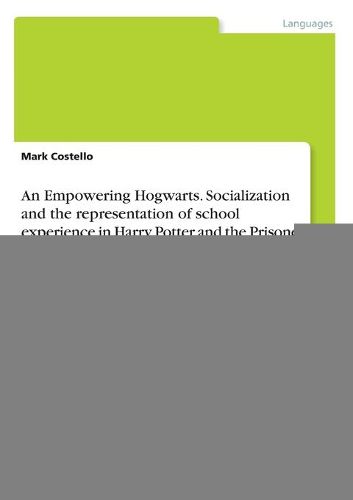Readings Newsletter
Become a Readings Member to make your shopping experience even easier.
Sign in or sign up for free!
You’re not far away from qualifying for FREE standard shipping within Australia
You’ve qualified for FREE standard shipping within Australia
The cart is loading…






Essay from the year 2017 in the subject English - Literature, Works, grade: 70, Trinity College Dublin (School of English), course: English Literature, language: English, abstract: A university essay exploring literary notions of boyhood, psychological maturity and the internalization of parental values all in the context of J.K. Rowling’s Harry Potter and the Prisoner of Azkaban and the school story genre. The essay argues that the rule-breaking culture inherent in Hogwarts lends itself to an overall empowering portrayal of the school. In J.K. Rowling’s third book, Harry Potter and the Prisoner of Azkaban, the school experience is represented as an overall empowering one. I propose to argue against the approaches of Roberta Trites and Mathew Grenby in their respective papers of The Harry Potter Novels as a Test Case for Adolescent Literature and The School Story. By evoking the power mechanism of the Foucauldian Panopticon they depict the Hogwarts school experience as one of complete authoritarianism. I will outline how Foucault’s ‘Panopticism’ is entirely inappropriate and unsustainable in the school of Hogwarts due to the impossibility of surveillance in its enchanted halls and the fallibility of its headmaster. Through its rule-breaking culture I will show how the Hogwarts school experience instead celebrates and encourages the independent questioning of existing dysfunctional power structures. I will explore the school experience of Hogwarts with regard to the themes of authority, power and tribal exclusivity, arguing that the overall portrayal of Hogwarts is an empowering one that inspires in its students independent thought and action against existing authority.
$9.00 standard shipping within Australia
FREE standard shipping within Australia for orders over $100.00
Express & International shipping calculated at checkout
Essay from the year 2017 in the subject English - Literature, Works, grade: 70, Trinity College Dublin (School of English), course: English Literature, language: English, abstract: A university essay exploring literary notions of boyhood, psychological maturity and the internalization of parental values all in the context of J.K. Rowling’s Harry Potter and the Prisoner of Azkaban and the school story genre. The essay argues that the rule-breaking culture inherent in Hogwarts lends itself to an overall empowering portrayal of the school. In J.K. Rowling’s third book, Harry Potter and the Prisoner of Azkaban, the school experience is represented as an overall empowering one. I propose to argue against the approaches of Roberta Trites and Mathew Grenby in their respective papers of The Harry Potter Novels as a Test Case for Adolescent Literature and The School Story. By evoking the power mechanism of the Foucauldian Panopticon they depict the Hogwarts school experience as one of complete authoritarianism. I will outline how Foucault’s ‘Panopticism’ is entirely inappropriate and unsustainable in the school of Hogwarts due to the impossibility of surveillance in its enchanted halls and the fallibility of its headmaster. Through its rule-breaking culture I will show how the Hogwarts school experience instead celebrates and encourages the independent questioning of existing dysfunctional power structures. I will explore the school experience of Hogwarts with regard to the themes of authority, power and tribal exclusivity, arguing that the overall portrayal of Hogwarts is an empowering one that inspires in its students independent thought and action against existing authority.